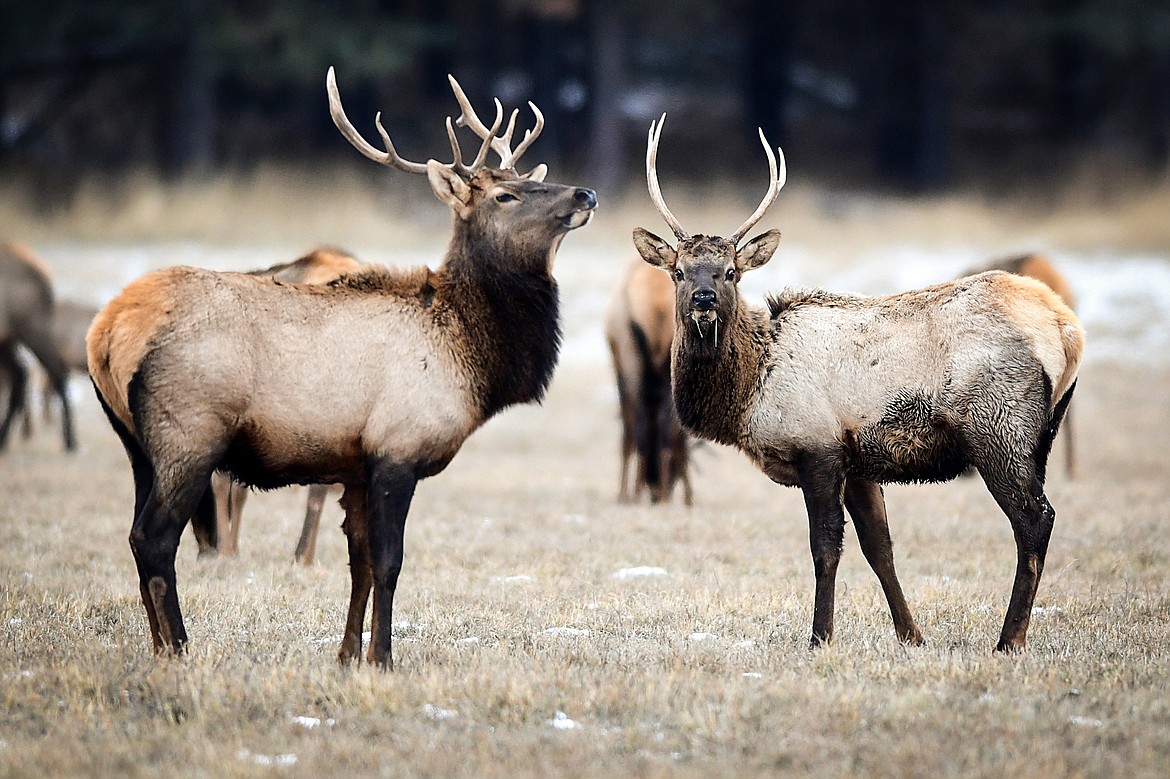Influx of out-of-state hunters dominates FWP citizens advisory meeting
Concern over out-of-state hunters dominated a meeting of Montana Fish, Wildlife and Parks’ Citizens Advisory Committee for Region 1 earlier this week.
The committee, which gathers five or six times a year typically, met in Kalispell to discuss the state agency’s priorities for the upcoming legislative session. Topics up for discussion included further development of an FWP app, the use of drones by hunters, hunting from highways and the removal of the 24-hour wait period accompanying a wolf license, among others.
But it was the bevy of out-of-state license plates that area hunters reported seeing during the season that drew the most conversation.
“... In the five week hunting season, across the state, everywhere I go, I ask people how their experience was and every single person would say, ‘I’m sick and tired of nonresident license plates,’” said Cody Voermans*, a hunter and a member of the committee from Columbia Falls.
Montana resident hunting tags are substantially cheaper — by hundreds of dollars — than nonresident tags and licenses. The nonresident tags fund much of FWP’s efforts and about 80% of the state's contribution to the block management fund is derived from nonresident passes.* The bulk of that fund is made up of federal dollars.
Several hunters at the meeting — about 30 people attended — expressed willingness to pay more for their resident tags to make up for a smaller number of nonresident tags.
“We would happily pay our fair share to reduce the pressure on the landscape,” Voermans said.
Legislators in attendance, though, warned of possible repercussions. Increasing the cost of licenses would likely provoke a statewide backlash, predicted Sen. Mike Cuffe, R-Eureka.
“I guarantee you we put the price of hunting licenses up and I’ll hear from a lot more than six people,” Cuffe said.
Overcrowding on fishing access sites proved another point of debate. Individuals without a fishing license can use access sites for purposes other than angling, but they are not paying for the upkeep of the property. That occasionally leaves anglers paying to maintain the land without access to the now overcrowded access points.
While the committee wrapped up its discussion without a policy solution, they did float the possibility of creating a conservation license for people using access sites for activities other than fishing.
MOLLY VANDEVOORT, the Region 1 chair, facilitated the wide-ranging conversation alongside Dillon Tabish, Region 1 information and education program manager, and Region 1 Supervisor Lee Anderson.
The committee, which boasts members from throughout the Flathead Valley and beyond, was tasked with giving FWP input on the agency’s goals for the 2023 legislative session. Many area legislators, including Cuffe and Sen. Mark Noland, R-Bigfork, Rep. John Fuller, R-Whitefish, also made an appearance.
The legislative breakdown was led by Ron Howell, former assistant chief and current legislative liaison for FWP. Howell outlined the key priorities for the agency in the upcoming session, many of which aim to clean up existing legislation and statutes.
Howell began by delving into FWP’s app development plan. Currently, the app only uses electronic tagging for game animals and wild turkeys. FWP officials are asking that any species that requires a carcass tag be eligible through the app. Hunters would have access to those tags without cell service if they were previously downloaded.
Using apps that potentially collect data in the field proved a discussion starter. The requested legislation would not be invasive, according to Howell, and will not track specific information, like exact locations. While the goal is implementing a fully online system, officials clarified that electronic tags will not become mandatory. Individuals wanting to continue using paper tags could do so, they said.
“This first phase of the app is intended to just be essentially a digital wallet,” Tabish, FWP’s information and education program manager, said. “The app will continue getting better with time, it’s just going slower than people wished.”
Likewise, the agency also wants to allow a paper carcass tag to accompany the harvest of an animal, rather than require the tag be attached to the animal, owing to the challenge of regular tags getting destroyed by blood or moisture.
The legislative plan also aims to make hunting off highways a violation as it has become a public safety issue, officials said, remove the 24 hour wait requirement after buying a wolf hunting license, and define aircraft and aerial vehicles and when hunters can employ them.
Other proposals included removing the sunset date of the Wildlife Habitat Improvement Program, which allows FWP to continue to offer up to $2 million in grants for weed treatment programs. There also is a push to let nonresident college students purchase licenses online, clean up nonresident snowmobile permits, and repeal the act requiring license agents to secure a surety bond.
Further, the department wants to increase House Bill 637’s block management cap to $50,000, clarify that an AIS Prevention Pass is not a prerequisite for lifetime fishing licenses for the blind, and get the authority to issue firearms, with training, to FWP employees beyond game wardens. Department officials also spoke on ensuring sustainable grizzly bear populations in delisted areas, as well as improving habitat for game birds.
The 2023 legislative session is set to begin on the first Monday of January.
Reporter Kate Heston can be reached at kheston@dailyinterlake.com.
*This article has been corrected to reflect that the speakers name is Cody Voermans. It also has been updated to indicate that nonresident tags fund about 80 percent of the state's contribution to the block management fund.


